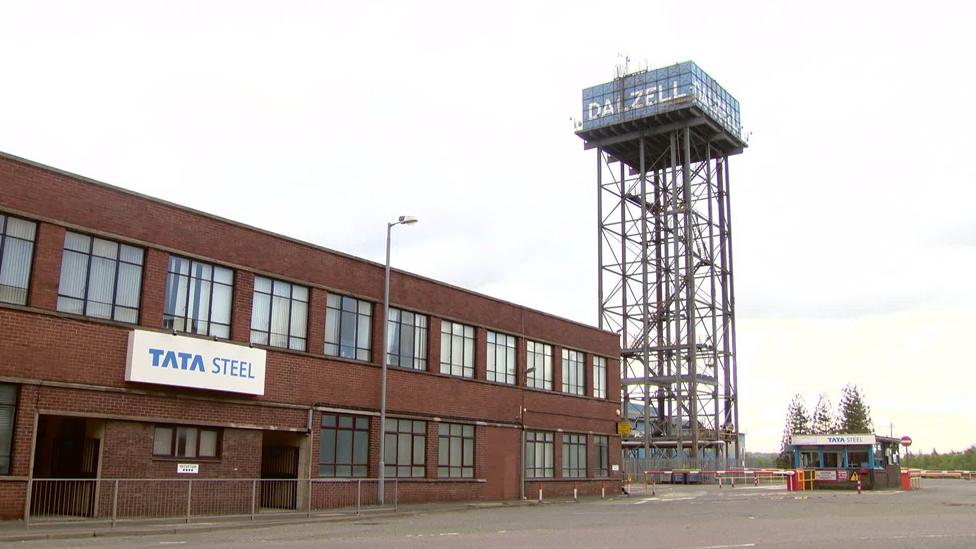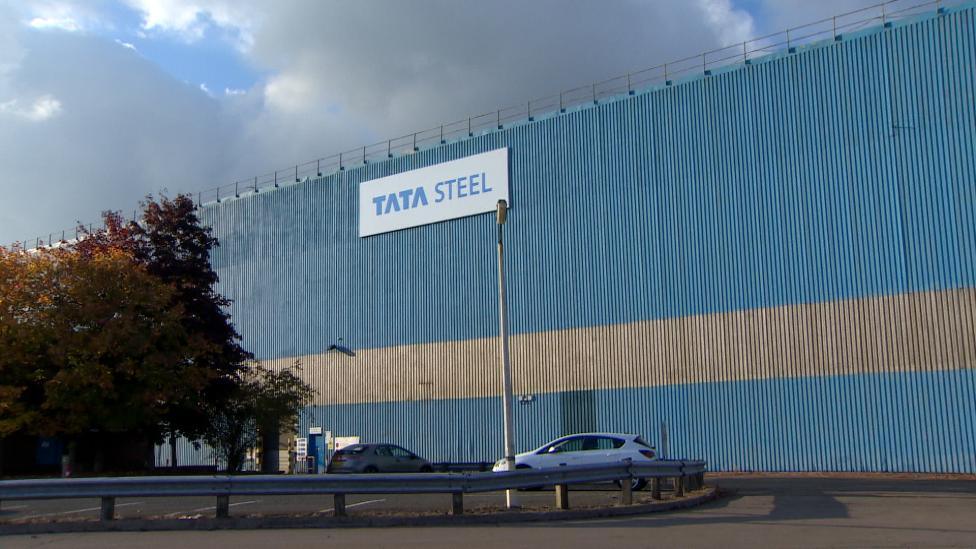Tata 'to close' Scotland's last major steelworks
- Published

Tata Steel employs about 400 people in Scotland, including about 350 at the Dalzell plant in Motherwell
About 400 jobs are under threat in Scotland with the expected closure of the country's last two major steelworks.
Tata Steel is expected to confirm next week that the jobs at its plants in Motherwell and Cambuslang will be among more than 1,000 being lost across the UK.
The firm is also expected to cut jobs at its facility in Scunthorpe.
Union leaders have called on government to act to save the industry.
Tata operates the Clydebridge plant in Cambuslang, where it employs about 70 people, with the remainder of its Scottish workforce based at its Dalzell plate rolling works in Motherwell.
Steel imports
The Dalzell Steel and Iron Works opened in 1872, and Clydebridge in 1887. The plants became two of the giants of Scottish industry, with Clydebridge providing steel plates which were formed into many of the most famous ships built on the River Clyde.
Tata declined to confirm on the job cuts, but said it had been facing challenges in the UK such as a surge in steel imports, and the strong pound.
A spokesman said: "We've made a number of structural changes to our UK business over the last months and years to make us more competitive. Like all companies we continue to review the performance of our business."

Analysis by Douglas Fraser, BBC Scotland business and economy editor

The Clydebridge plant in Cambuslang opened in 1887
Many Scottish communities still identify themselves by the industries that have been closing down for decades. For them, the expected closure of steel plants in Motherwell and Cambuslang has a familiar, grim feel to it.
Near the Dalzell plant is the Ravenscraig site, 23 years after its cooling towers, as a totem of Scottish heavy industry, were felled. It has been detoxified, but is still a vast brownfield site and a reminder of how hard it can be to recover and reinvent a one-industry town.
Behind the closures are global pressures; China can make 1.1bn tonnes of steel each year, of which around a third is over-capacity. It is offloading steel into western markets, undercutting even efficient plants. Prices are at their lowest level for 11 years. For the UK and US, relatively strong currencies make imports cheaper still. And Britain has relatively high energy costs.
The UK government can go some way to offsetting the latter, and the European Commission can fight subsidised imports. But politicians are pushing against some powerful global forces if they wish to see steel retained as a strategically vital presence.
The government in London is less keen on intervention to help industry than the Scottish government, though employers at the CBI are calling for a long-term industrial strategy.
John Swinney isn't ruling out anything, but prefers the experience of finding a buyer and contracts for Ferguson Marine, the shipyard in Port Glasgow, than the precedent of taking over loss-making Prestwick Airport.
Anyone with ideas about saving the Scottish steel plants will have to contend with the challenges of a highly integrated industry, feeding steel through from Scunthorpe and Port Talbot in Wales.

Roy Rickhuss, general secretary of the Community trade union, said: "Clearly this is extremely worrying news for all those who may be affected. We'll be seeking further discussions with Tata Steel to understand the full detail, examine alternatives that may safeguard jobs and uphold our principle of opposing compulsory redundancies.
"This is yet another blow to our steel communities and demonstrates the precarious state of the UK steel industry and emphasises the need for government action which Community and the employers have been calling for at the summit today.
"We will also be seeking a meeting with the Scottish government as a matter of urgency to discuss what support they can offer to Tata Steel's Scottish steel mills at Dalzell and Clydebridge."
Scottish Finance Secretary John Swinney said workers at the plants were "part of the very deep, skilled tradition of industrial activity within Scotland".
And he said the Scottish government would work to ensure that every possible option was explored to secure a future for the plants and their workforces.
Speaking at the SNP conference in Aberdeen, former First Minister Alex Salmond said UK ministers must be "prepared to make intervention" at the Tata Steel plants.
Plunging prices
He said doing nothing to save them made "no sense", and added: "I can't believe David Cameron wants to be remembered as the prime minister under whose watch the UK steel industry disappeared altogether."
Scottish Labour leader Kezia Dugdale said that, if the reports were accurate, it could "signal the end of the steel industry in Scotland".
She added: "That would not only be the end of an era, it would be devastating for the workers, their families and the local economies. The full force of the UK and Scottish governments must be used to support the workers and the industry."
News of the potential cuts emerged as the UK government held a summit in Rotherham to discuss the crisis gripping the industry amid plunging prices and cheap imports.
Business Secretary Sajid Javid said after the summit: "There is no straightforward solution to the complex global challenges facing the steel industry. But today was an important opportunity to bring the key players together and we now have a framework of action.
"The government is committed to working closely with industry on both short-term and long-term issues and to doing everything we can to support both industry and the workers."